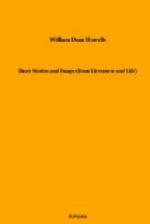The difficulty in humbling one’s self to this view of art is in the ease with which one may please the general by art which is no art. Neither the play nor the playing that I saw at the theatre when the actor was hissed for the wickedness of the villain he was personating, was at all fine; and yet I perceived, on reflection, that they had achieved a supreme effect. If I may be so confidential, I will say that I should be very sorry to have written that piece; yet I should be very proud if, on the level I chose and with the quality I cared for, I could invent a villain that the populace would have out and hiss for his surpassing wickedness. In other words, I think it a thousand pities whenever an artist gets so far away from the general, so far within himself or a little circle of amateurs, that his highest and best work awakens no response in the multitude. I am afraid this is rather the danger of the arts among us, and how to escape it is not so very plain. It makes one sick and sorry often to see how cheaply the applause of the common people is won. It is not an infallible test of merit, but if it is wanting to any performance, we may be pretty sure it is not the greatest performance.
III.
The paradox lies in wait here, as in most other human affairs, to confound us, and we try to baffle it, in this way and in that. We talk, for instance, of poetry for poets, and we fondly imagine that this is different from talking of cookery for cooks. Poetry is not made for poets; they have enough poetry of their own, but it is made for people who are not poets. If it does not please these, it may still be poetry, but it is poetry which has failed of its truest office. It is none the less its truest office because some very wretched verse seems often to do it.
The logic of such a fact is not that the poet should try to achieve this truest office of his art by means of doggerel, but that he should study how and where and why the beauty and the truth he has made manifest are wanting in universal interest, in human appeal. Leaving the drama out of the question, and the theatre which seems now to be seeking only the favor of the dull rich, I believe that there never was a time or a race more open to the impressions of beauty and of truth than ours. The artist who feels their divine charm, and longs to impart it, has now and here a chance to impart it more widely than ever artist had in the world before. Of course, the means of reaching the widest range of humanity are the simple and the elementary, but there is no telling when the complex and the recondite may not universally please. 288
The art is to make them plain to every one, for every one has them in him. Lowell used to say that Shakespeare was subtle, but in letters a foot high.




